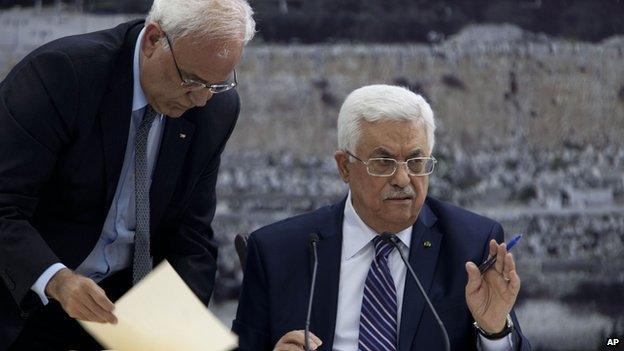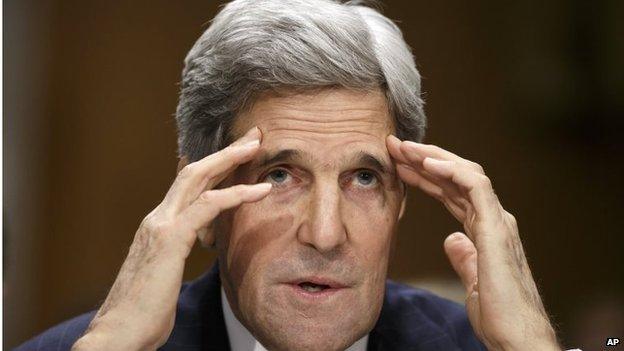Israel imposes tax sanction on Palestinian Authority
- Published

Israel is responding to the signing of several UN treaties by Palestinian President Mahmoud Abbas last week
Israel has imposed sanctions against the Palestinian Authority (PA) in retaliation for its signing up to join international treaties, officials say.
They say taxes collected on behalf of the PA will be frozen, with limited access to bank deposits in Israel.
Palestinian chief negotiator Saeb Erekat condemned the move as "Israeli hijacking" and "theft".
It is the latest in a series of steps by both sides which have strained US-led peace-making efforts.
Israel says the move by the PA to join the treaties breached a commitment made before talks resumed last July after a three-year hiatus.
On Friday, Switzerland confirmed that "the state of Palestine" had acceded to the Geneva Conventions, which govern the rules of war and military occupations.
The Palestinians have repeatedly accused Israel of breaching the Fourth Geneva Convention, external by pursuing settlement construction in East Jerusalem and the West Bank, occupied by Israel since 1967.
Israel has rejected the charge, saying the convention should not apply there since neither had been sovereign territory but under Jordanian occupation when Israel took control of them in the 1967 Middle East war.
'Narrowing gaps'
Israeli officials are quoted as saying that debt payments will be deducted from tax transfers routinely received by the PA.
Israel collects taxes on behalf of the Palestinians, and transfers about $100m (80m euros) per month, accounting for two-thirds of the authority's budget.
It is not yet clear how much money will be withheld or for how long.
Israel has also said it will suspend its participation in a gas exploration off the coast of the Gaza Strip.
Mr Erekat told AFP news agency it was "theft of the Palestinian people's money" and a "violation of international law and norms by Israel".

John Kerry has said steps taken by Israel and the Palestinians have been "unhelpful"
Israel decided on Wednesday to limit its contacts with Palestinian officials in reaction to PA President Mahmoud Abbas's application last week to join 15 international treaties and conventions, external
Meanwhile, US state department spokeswoman Jen Psaki confirmed a new round of talks between Israeli, Palestinian and US officials had taken place on Thursday.
She said the gaps were narrowing, but played down reports of a deal in the making.
Negotiations between Israelis and Palestinians have faltered in recent weeks, with each side accusing the other of violating commitments.
The Palestinians were angry when Israel did not sanction the release of a fourth batch of Palestinian prisoners, as agreed in principle under the terms on which they returned to peace talks last year.
Palestinian officials say Mr Abbas's move to join the treaties and conventions was a response to Israel's failure to release the prisoners.
Israel stressed that it had made any prisoner release conditional on progress being made in the negotiations and on the Palestinians abiding by a commitment not to take unilateral steps which could be seen as furthering statehood - an issue both sides agreed to settle in peace talks.
Earlier this week, US Secretary of State John Kerry said recent actions by both Israel and the Palestinians, including an Israeli decision to reissue tenders for 700 new settlement units in occupied East Jerusalem, had complicated efforts to advance the peace process.
Israel captured East Jerusalem from Jordan in the 1967 war and formally annexed the area in 1980 - a move not recognised internationally. Palestinians want East Jerusalem as the capital of a future state.
Settlements built there and elsewhere in the occupied West Bank are considered illegal under international law, though Israel disputes this.